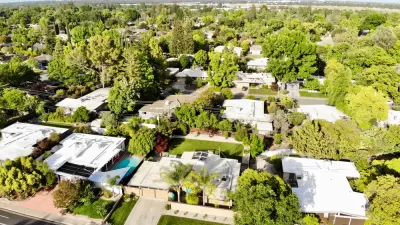Elections have consequences, and a new, younger City Council in Raleigh is ready to implement progressive planning and land use reforms.

"Raleigh leaders took the first step toward changing the rules that developers have to follow to address housing affordability," reports Anna Johnson.
The rules—still in the early stages on the way to approval as several new City Council members push for reform of land use and development regulations in the city—focus on several key ideas to ease development and reduce costs for all kinds of development, not just housing.
Downtown Parking Requirements
"If a developer wants to build a commercial project in downtown Raleigh, the city has required a parking space for every 500 square feet. City leaders have taken the first step to remove that requirement," reports Johnson.
Missing Middle Housing
Following in the footsteps of Minneapolis, the Raleigh City Council decided to explore the idea of adding "cottage courts" in areas zoned R-2 and R-4. Councilmember David Cox was the lone vote against the study, writing a blog post after the vote that lamented the city's move "toward ending single family zoning." Cox also expressed negative feelings about the new makeup of the City Council after the election in October.
Building Heights
"The council also voted to remove the height cap for buildings seven stories and above," reports Johnson. "The city’s code had limits for height and stories for buildings, and removing the height cap will result in better buildings being built throughout Raleigh..."
FULL STORY: Raleigh leaders promised to change the rules for housing affordability. It’s starting.

Maui's Vacation Rental Debate Turns Ugly
Verbal attacks, misinformation campaigns and fistfights plague a high-stakes debate to convert thousands of vacation rentals into long-term housing.

Planetizen Federal Action Tracker
A weekly monitor of how Trump’s orders and actions are impacting planners and planning in America.

San Francisco Suspends Traffic Calming Amidst Record Deaths
Citing “a challenging fiscal landscape,” the city will cease the program on the heels of 42 traffic deaths, including 24 pedestrians.

Defunct Pittsburgh Power Plant to Become Residential Tower
A decommissioned steam heat plant will be redeveloped into almost 100 affordable housing units.

Trump Prompts Restructuring of Transportation Research Board in “Unprecedented Overreach”
The TRB has eliminated more than half of its committees including those focused on climate, equity, and cities.

Amtrak Rolls Out New Orleans to Alabama “Mardi Gras” Train
The new service will operate morning and evening departures between Mobile and New Orleans.
Urban Design for Planners 1: Software Tools
This six-course series explores essential urban design concepts using open source software and equips planners with the tools they need to participate fully in the urban design process.
Planning for Universal Design
Learn the tools for implementing Universal Design in planning regulations.
Heyer Gruel & Associates PA
JM Goldson LLC
Custer County Colorado
City of Camden Redevelopment Agency
City of Astoria
Transportation Research & Education Center (TREC) at Portland State University
Jefferson Parish Government
Camden Redevelopment Agency
City of Claremont





























